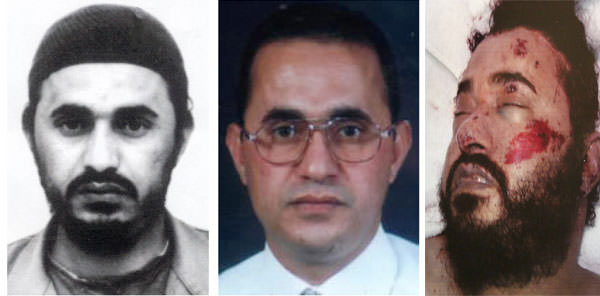 Middle East
Middle East
The Many Faces of Abu Musab al Zarqawi
Jun 10, 2006 He led Al Qaeda in Iraq, but who was he? What drove Zarqawi to his murderous ends? And what can we learn from his death? Nir Rosen, one of the only Western journalists to have reported extensively from inside the Iraqi insurgency, lays out some answers. Acclaimed Iraq journalist Nir Rosen explores the life, death and intellectual underpinnings of the terrorist who led Al Qaeda in Iraq. 1 2 3 4 5Editor's note: With the death this week of terrorist mastermind Abu Musab al Zarqawi, many experts are predicting that the Iraqi insurgency will find itself crippled and leaderless. But according to Nir Rosen, one of the only Western journalists to have reported extensively from inside the Iraqi insurgency, the ideologies that propelled Zarqawi into his leadership role will soon find another champion, and the sectarian conflict engulfing the country will continue to worsen.
Who was Zarqawi? What drove him to his murderous ends? And what can we learn from his death? Rosen, who has spent the last three years covering the Iraqi conflict, lays out some answers.
Abu Musab al Zarqawi, the "Sheikh of the Slaughterers," is dead. So dies an American myth -- that of the "most wanted man" in Iraq. But other myths persist: that Zarqawi's death will have positive consequences; or that "victory," whatever that might mean, is possible in Iraq in the wake of Zarqawi's death.
If we're to evaluate those claims, we must first ask: Who was Zarqawi and what does his passing portend? Born in 1966 as Ahmad Fadhil Nazal al Khalaylah, Zarqawi hailed from the Jordanian town of Zarqa, a poor city north of Amman, Jordan. The region of Zarqa had been the capital of radical Islam in Jordan since the 1960s. It also produced most of the Jordanian jihadis now fighting in Iraq.
Zarqawi, who took his city as his namesake, had been a wild young man with no interest in religion. A high school dropout, he had a reputation for getting tattoos, drinking alcohol and getting into fights, ending up in jail. Like many disaffected Muslim youths, he was moved by stories of mujahedin heroism against the Russians in Afghanistan. By the time he arrived, however, as a 23-year-old, the Russians had withdrawn, and Zarqawi took up arms in the country's civil war.
His journey to Afghanistan was arranged by the Abd Allah Azzam's Office of Services and Jihad, then run by Azzam's follower Sheikh Abdel Majid al Majali, or Abu Qutaiba. Azzam's son Hudheifa told me that in 1989 he had picked up Zarqawi from the airport in Peshawar, Pakistan, and took him to the Beit al Shuhada rest house. "Zarqawi was a very simple person, silent, he didn't talk. As a witness I can say that he was very well trained in military skills, especially in making bombs. In English you say "braveheart," but he had a dead heart, he was never scared. Bin Ladin wanted Zarqawi to join Al Qaeda but he didn't like Al Qaeda's ideology so he left for Khost. I saw him in Gardez and Khost; if he was alone against a thousand soldiers he would not go back. He was not a leader at the time, just an ordinary person and a good fighter.
In Afghanistan Zarqawi learned not only military skills but also received ideological training, in Salafi jihadism. Named after "al Salaf al Salih," or the virtuous predecessors, meaning the companions of the Prophet Mohammed and their followers, Salafis sought to purify Islam of innovations introduced over the centuries since the Prophet first received his revelations, and they sought to return to a way of life similar to that of the early Muslim community, basing life only on the Quran and the Sunna, or the deeds and words of the Prophet.
Often erroneously called Wahabis, a term some incorrectly use to describe the strict Saudi brand of Islam, Salafis argued that the Quran was the literal word of God and could not be interpreted. They stressed the importance of tawhid, or the unity and oneness of God, and condemned examples of shirk, the belief that God might have partners. Any practice or belief not supported directly by the Quran or Sunna was bid'a, or an innovation, and fighting innovators was crucial to Salafis. Although most Salafis concentrated on peaceful missionary activity, some radical Salafis engaged in takfir, or the act of calling somebody a kafir, an apostate who has renounced his religion and is therefore subject to death. As a result, radical Muslims who believed that the use of violence was justified against those who deviated from Islam were called takfiris. They believed jihad was the "absent obligation," the sixth pillar of Islam. Although jihad meant only to strive or to struggle, such as an internal struggle to become a better Muslim, jihad meant only holy war against the enemies of Islam. Worse than Jews or Christians to Salafis, Shia were known as rafidha, or those who reject Islam, a pejorative term akin to "nigger." Salafi ideologues dominated Jordan's mosques, and young men filled their ranks.
Next Page: "In prison, the awkward and solemn Zarqawi began to bloom in his own jihadi way..."
You need to be a supporter to comment.
There are currently no responses to this article.
Be the first to respond.